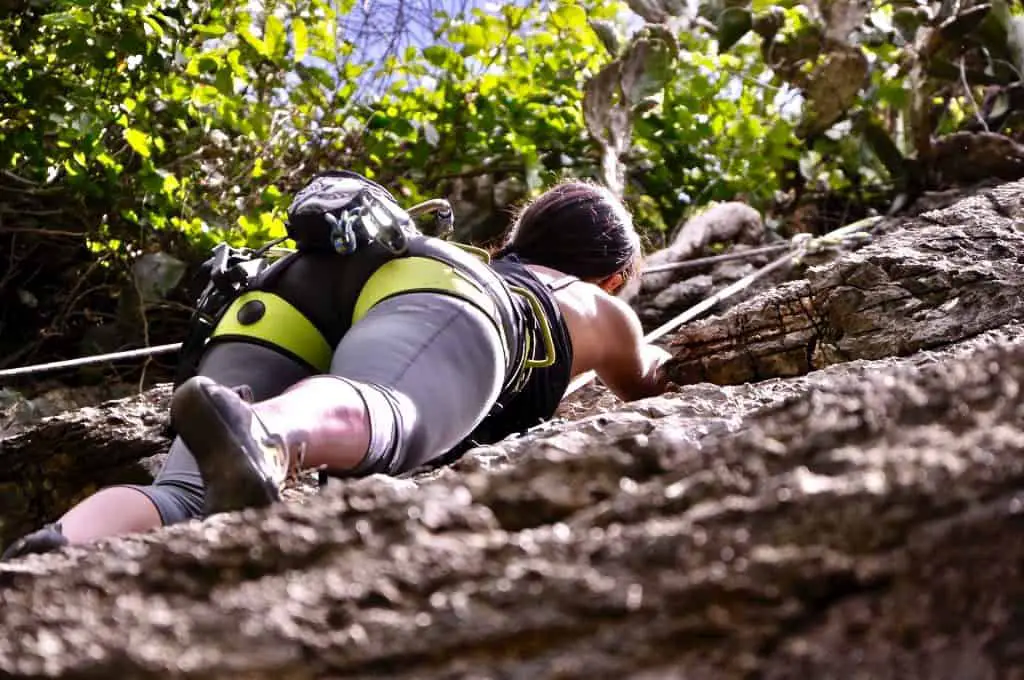
Many people, including myself, believe rock climbing to have calming effects on the mind. It’s true, rock climbing has been scientifically proven to help your mental health in all sorts of different aspects. And it’s an obvious statement that the more peaceful your mind is, the less stressed you feel. In this article we’ll discuss why rock climbing reduces long-term stress.
So how does rock climbing reduce stress? When someone is rock climbing their body releases dopamine, noradrenaline and serotonin. These are monoamine neurotransmitters and chemicals that play a big part in the balance and regulation of your overall mood, including how stressed you feel. By helping your brain release these chemicals in a healthy way you feel less stressed.
Rock climbing helps you live in the moment, which is called “mindfulness”, and is something that has been practised for thousands of years. Mindfulness is an age old way of keeping the mind calm and stress free. Climbing in nature is even better for the mind. Surrounding yourself in the countryside or a natural environment has been proven to make you feel happier. If you’re climbing in a group or with someone else then this reduces stress levels because direct face-to-face contact has also shown to help relieve stress. Rock climbing has also been proven to improve anxiety and depression in humans, which can be linked directly to stress.
Page Jumps
- Ways Rock Climbing Reduces Stress
- 10 More Activities that Can Treat Stress
- How Does Chronic Stress Affect Your Health?
Ways Rock Climbing Reduces Stress
Rock climbing is known to be good for mental health in many ways (click here to see an article I’ve written on its benefits to anxiety and depression). Just like most other exercises, it is no different to when it comes to the reduction of stress on the mind. The good thing about climbing is that you can do it indoors or outdoors. And the added bonus of outdoor rock climbing in nature can really benefit the mental health of the climber. Just being in nature can improve overall mood and happiness, but with the added mindfulness and exercise that rock climbing gives you it’s a fantastic activity to improve stress levels and overall mental health.
Climbing with a partner or in a group can also help your mental health because direct face-to-face contact has shown to relieve stress.
According to this study, when you exercise you release the three major monoamine neurotransmitters: noradrenaline, dopamine, and serotonin. As discussed already, these are chemicals that regulate your mood. The study in question here puts forward the notion that all types of exercise improve brain function and can work against neurological disorders.
It is known that depression and stress are sometimes linked. For example, chronic stress can lead to depression or depression can lead to chronic stress. Rock climbing has been shown to reduce symptoms of depression which in turn can reduce levels of stress.
While on the climbing wall you are living in that moment. You’re focusing on not falling, on transitioning, and on thinking about the logical next move without slipping or losing grip. When we’re living in the moment we aren’t focusing on anything else. This is called mindfulness. Whenever I mention mindfulness I like to take a quote out of a book called The Miracle of Mindfulness by Thich Nhat Hanh:
“If while washing dishes, we think only of the cup of tea that awaits us, thus hurrying to get the dishes out of the way as if they were a nuisance, then we are not “washing the dishes to wash the dishes.” What’s more, we are not alive during the time we are washing the dishes. In fact we are completely incapable of realizing the miracle of life while standing at the sink. If we can’t wash the dishes, the chances are we won’t be able to drink our tea either. While drinking the cup of tea, we will only be thinking of other things, barely aware of the cup in our hands. Thus we are sucked away into the future -and we are incapable of actually living one minute of life.”
So what does this mean? We have to focus on the moment we have now rather than thinking about the past or the future all the time. Otherwise we are not truly alive. Stress is down to us FOCUSING on thoughts that CAUSE us to worry, so we need to divert those thoughts onto something else. Being in the moment, watching life go by in real time reduces stress. This is the reason why climbing helps, because it gets you to live in the moment.
10 More Activities that Can Treat Stress
In this section we have activities and sports that can treat stress. A lot of these can be or even should be practised alongside rock climbing. For example yoga and rock climbing go together really well.
Yoga
Yoga is one of those activities which is known for its benefits on calming the mind. There’s a very good reason for this, not only are you exercising (which as we know is good way to reduce stress) but you are also focusing on being in the moment. Stretching is also very healthy. I stretch every night before bed and I find it to be a very good way to calm me down after a long day before I put my head down. There are many free videos on YouTube to get you started and Yoga classes aren’t very expensive. Whether you’re male or female, give it a shot!
Team Sports
Team sports have shown to help reduce stress and improve quality of life more than individual workouts. If you regularly take part in a team sport you are also less likely to suffer from anxiety and depression. There are many types of team sports including soccer, football, basketball, baseball, hockey, cricket, rugby and many more.
Meditation
Meditation is another activity I would highly recommend if you’re feeling stressed or anxious. When I’m not feeling mentally prepared for the day ahead I take 15 minutes to sit down and focus on my breathing to calm my mind. When someone says “meditation” many people believe it’s some weird form of contacting the dead or something. It’s nothing like that; quite simply it’s focusing on your breath to bring yourself back to the moment and calm your mind. By calming your mind you lower your heart rate which is what we’re aiming for if you’re stressed.
Talking with a Friend
Talking out your problems with someone, whether it’s a friend or a professional can seriously help your mental health. Having someone listen and even offer their opinion about your problems can leave you feeling completely refreshed. You might be given a whole new take on how you feel if you talk to someone else.
Martial Arts and Boxing
I can attest myself that there’s nothing like hitting a punch bag or wrestling with someone else to help decrease the amount of stress you feel. I remember coming back from school once when I first started boxing and I’d just bought a punch bag. I’d got my results back from a test and it hadn’t come back as a very good score so I smacked that punch bag like there was no tomorrow. I felt great afterwards, there’s nothing like getting a bit of anger out in a healthy way.
Cycling
Cycling is a great exercise and can be done on your own or in a group. If you cycle along country roads it also gives you that feeling of being in nature which has also been proven to improve overall happiness.
Nature
As discussed above, being in nature can improve your overall mood. That’s why there are many people who absolutely love going for walks and hikes. As little as 10 minutes per day in nature can help college students feel happier and reduce effects of mental and physical stress.
Adult Colouring Books
Adult coloring books are great for bringing about mindfulness. Coloring is very similar to meditation in that it makes you focus only on the moment rather than all of the other thoughts that slip into your mind.
Tai Chi
Tai chi is described as meditation in motion. Originally developed as a martial art in China for self defense, tai chi is now practised as a stress relieving exercise which also has many other health benefits such as improved sleep. It, again, makes you focus on the moment.
Baking
A couple of surveys have shown that 60-80% of people in the north of the UK started baking to relieve pressure and stress. Baking allows you to express yourself more creatively and makes you focus on the task at hand when it comes to measuring out your ingredients etc.
How Does Chronic Stress Affect Your Health?
Stress is a term we use quite often but it’s a very broad term. You can have chronic stress (stress over a long period of time) or acute stress (short term stress). If you are stressed for a long time this is more likely to affect your mind and body in a negative way.
When you are stressed your body gives off a somatic response where the muscles tense up constantly, guarding yourself from any predator or from injury. This is a good thing short term if you’re actually in need of a fight or flight response. However, we only want this response in those times of need. If the body is constantly tense then this has shown to give people tension headaches, migraines, upper and lower back pain, and skeletal pain.
The respiratory and cardiovascular systems are also hit by chronic stress. Stress can cause shortness of breath because the airways that help you to breathe constrict. This can be a problem for people with lung problems such as asthma or COPD. Because of the constriction of the airways, some people may hyperventilate which may then cause panic attacks.
Chronic stress increases your heart rate which can cause hypertension, heart attacks and strokes if the stress is not dealt with. The blood vessels within the body also have to do more; under stress they dilate which increases the body’s blood pressure.
Stress can cause reflux disease (GERD), colitis, IBS and many other problems with the gastric system. It can also cause a lot of problems in the skin and hair department, for example it can cause psoriasis, eczema and hair loss.
These are just a few different areas in which chronic stress can affect, so it’s probably a good idea to try to find a way to calm your mind as soon as possible.
